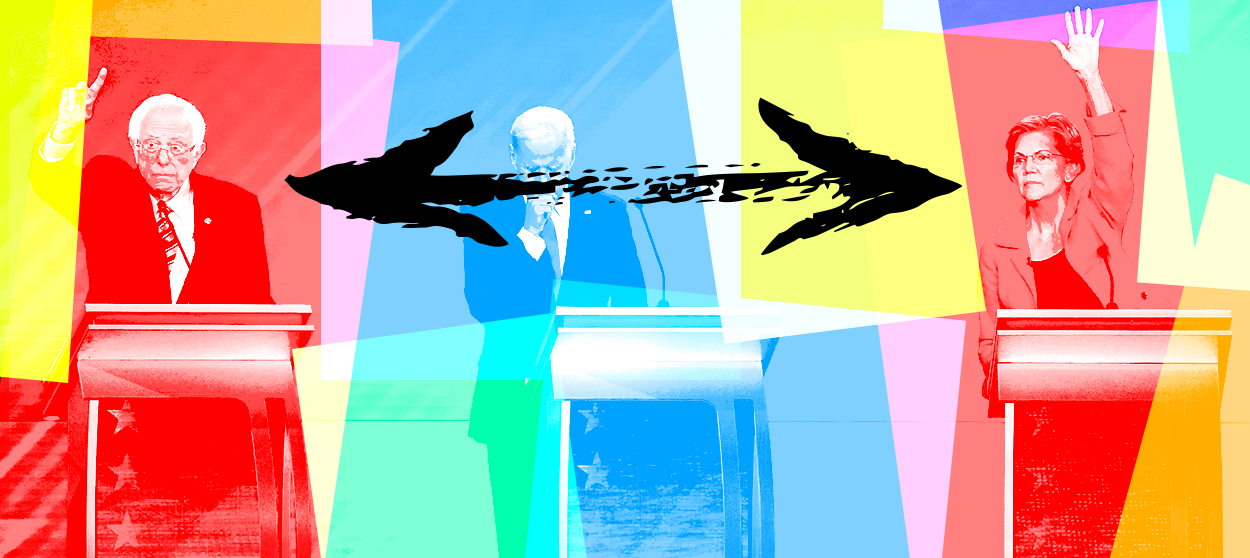Glimpses of the coming Warren-Sanders smackdown
The two far-left progressives can't coexist peacefully forever — if they want to win


A free daily email with the biggest news stories of the day – and the best features from TheWeek.com
You are now subscribed
Your newsletter sign-up was successful
Several moments during Thursday night's feisty and interminable Democratic debate in Houston could serve as material for headlines and Twitter chat. In a shocking exchange early on, former Obama administration official Julián Castro claimed that Joe Biden had forgotten something he'd said two minutes earlier and insinuated that the former vice president is suffering from senility. Later in the evening, Biden responded to several questions with such thoroughgoing incoherence that it seemed Castro might have had a point. Sens. Kamala Harris (Calif.), Cory Booker (N.J.), and Amy Klobuchar (Minn.) each had several opportunities to shine — though probably not brightly enough to change the basic dynamic of the race.
The dynamic is this: Biden is the frontrunner and his two strongest rivals for the nomination — Sens. Elizabeth Warren (Mass.) and Bernie Sanders (Vt.) — come from the far-left wing of the party. This means that the time will soon come when Warren and Sanders are going to have to go after each other instead of forming a mostly united front against the more centrist Biden, which is what they did Thursday night, just as they did in the previous debate in July.
That is the battle that awaits the Democrats — the contest to see which champion and vision of the left will prevail, seek to commandeer the party, and take on Donald Trump.
The Week
Escape your echo chamber. Get the facts behind the news, plus analysis from multiple perspectives.

Sign up for The Week's Free Newsletters
From our morning news briefing to a weekly Good News Newsletter, get the best of The Week delivered directly to your inbox.
From our morning news briefing to a weekly Good News Newsletter, get the best of The Week delivered directly to your inbox.
On Thursday evening, there was little sign of such a smackdown. Warren and Sanders, standing on either side of Biden's podium, each offered their own versions of progressive passion. Sanders, sounding like he was suffering from a cold, came off as even angrier, older, and more disheveled than he usually does as he pushed his agenda of ambitious redistribution and regulation to combat the inequality and unfairness that he claims permeates American life. Warren looked and sounded about four decades younger than her rival for the left's affections. She came off as earnest, informed, and articulate in her own expressions of anger about the country's many problems.
At no point did the two take direct aim at each other, with the exception of an implicit sharp disagreement over the Senate filibuster. Warren, quite understandably, wants to abolish it, since it creates a formidable obstacle to passing progressive legislation. Sanders, inexplicably, insists on defending it. That seemingly small dispute points to a much bigger difference in their sensibilities that is bound to become an issue as they begin to turn on each other. Warren believes that every progressive victory will have to be won through bloody trench warfare, whereas Sanders talks about leading a popular movement that will bring about a fundamental transformation in American politics. Apparently this transformation will be so total that corralling 60 votes in the Senate will be no problem at all.
This and other differences between Warren and Sanders are bound to become points of hot dispute — and soon. Biden's lead in the polls once surpassed the combined total of his two left-wing opponents. But not any longer. Together they're polling at about 34 percent to Biden's 27. A left unified behind one standard bearer could shake and even shatter the Biden campaign's desired narrative of inevitability. But a divided left remains in second and third place nationally, with state-level contests primed to be divvied up among all three leading candidates — a recipe for a brokered convention that could well shatter the party altogether.
Victory requires that the left makes a choice. But neither candidate is going to bow out selflessly. Aside from the personal ambition that's driving them, there are their supporters. Sanders is leading a quasi-spiritual revolution that would end in democratic socialism in America, and those who believe in that aim are deeply devoted to the movement's leader. Warren, meanwhile, carries all the hopes of the slightly less utopian progressive left along with the pent-up longing of millions of liberal women intensely eager to see one of their own at long last take down the Republicans, and especially Trump.
A free daily email with the biggest news stories of the day – and the best features from TheWeek.com
That means a fight to the death awaits us.
In Houston on Thursday night, the left remained at peace. But not for long.
Want more essential commentary and analysis like this delivered straight to your inbox? Sign up for The Week's "Today's best articles" newsletter here.
Damon Linker is a senior correspondent at TheWeek.com. He is also a former contributing editor at The New Republic and the author of The Theocons and The Religious Test.
